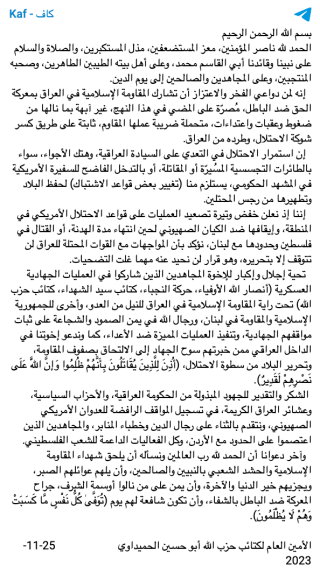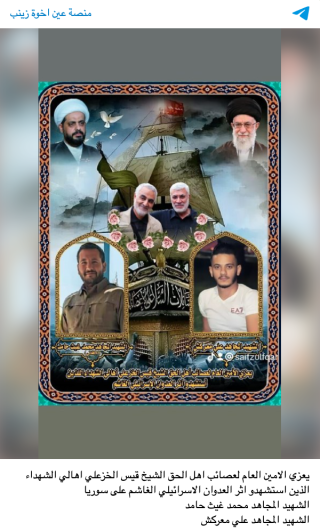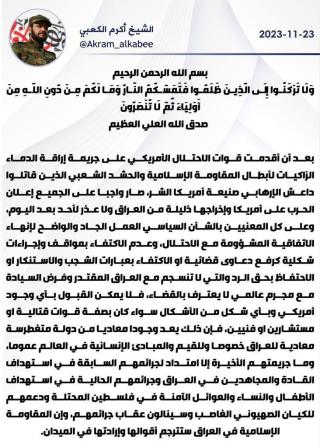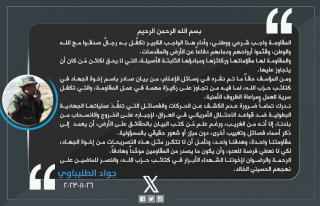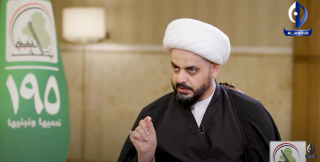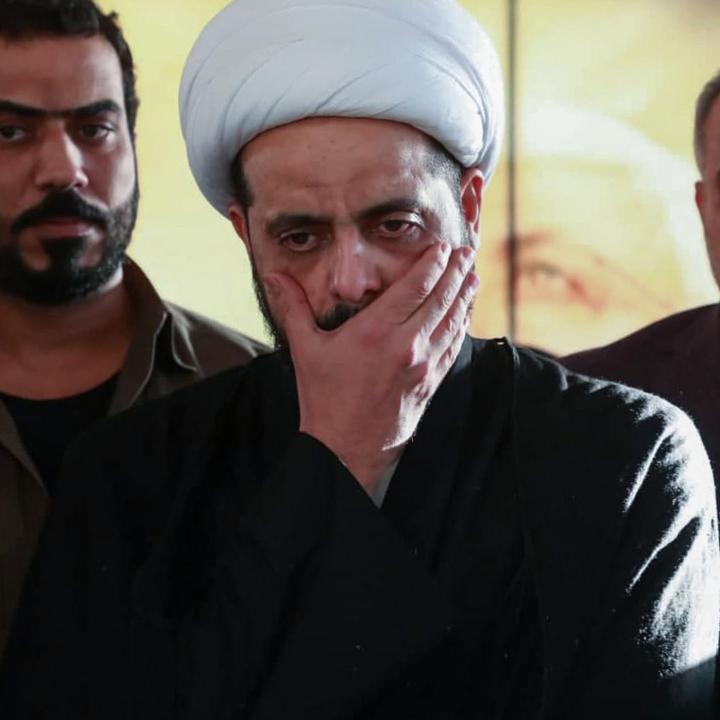
Militia Hair-Pulling Over Who Are "The Truest Muqawama"

Amid their ceasefire in solidarity with events in Gaza, Iraqi "resistance" leaders went back to their old habits of diminishing each other and spilling their secrets, with interesting results.
On November 25, the secretary-general of Kataib Hezbollah (KH), Ahmad Mohsen Faraj al-Hamidawi (aka Abu Hussein), issued a statement announcing a reduction in Iraqi muqawama (resistance) attacks against U.S. bases in Iraq and Syria. His words were telling in several regards.
Making a List, Checking It Twice
Abu Hussein's statement specifically named the militias that took part in the latest anti-U.S. strikes. He thanked “the Mujahedin brothers who participated in military jihad operations," naming Ansar Allah al-Awfiya, Harakat Hezbollah al-Nujaba (HaN), Kataib Sayyid al-Shuhada (KSS), and KH, noting that their attacks were carried out under "the banner of the Islamic Resistance in Iraq” (Figure 1). Arguably, he listed the factions in what he views as reverse order of significance, giving prime placement to KH and KSS (reflecting the U.S. government's apparent focus as well, if recent sanctions and airstrikes are any indicator).
In “outing” the club of militant players involved in anti-U.S. attacks since October 17, Abu Hussein seemed to deliberately leave out Asaib Ahl al-Haq (AAH). Yet while AAH has not undertaken any known attacks at home during the current campaign, it may be playing an important role in consolidating Iran’s influence next door in Syria by providing transportation and logistics services. This could explain why two AAH fighters were killed in a recent Israeli airstrike in Syria and mourned by AAH leader Qais al-Khazali (Figure 2).
KH Escalates, But Accepts Truce
Abu Hussein also pointed out the reason behind the reduction in attacks: “The occupation's continued infringement on Iraqi sovereignty and the violation of the [Iraqi] airspace, whether by reconnaissance drones or fighter planes, or by the scandalous interference of the American ambassador in the governmental scene, requires us to change some of the rules of engagement to preserve the country and purge it from the abomination of the occupiers...We declare the reduction of the pace of escalation of operations against the American occupation bases in the region, and to stop them against the Zionist entity until the end of the truce, or the fighting in Palestine and its borders with Lebanon.” That is, even as he linked the decision to the truce in Gaza, he also noted that KH attacks "against the occupying forces in Iraq will never stop until Iraq is liberated," suggesting that strikes will resume after the ceasefire.
HaN Calls for Full-Throttle Escalation
Abu Hussein’s statement seemed to supersede one published two days earlier by HaN secretary-general Akram Kaabi, who responded to U.S. strikes against KH bases in Jurf al-Sakhar by stating, “It has become a duty for everyone to declare war on America and remove it, humiliated, from Iraq. There is no excuse for anyone after today” (Figure 3). Kaabi’s statement came at a time when the ceasefire between Israel and Hamas was imminent, yet he still called for escalation.
Additionally, the fact that the announcement regarding a reduction in attacks was announced by Abu Hussein and not Kaabi is another indication of their groups' different roles in the recent kinetic campaign. Kaabi, as secretary of the Iraqi Resistance Coordination Committee (al-Haya al-Tansiqiya lil-Muqawama al-Iraqiya), is usually responsible for announcing such stances.
AAH Reacts to KH’s Snub
AAH was quick to show its dissatisfaction with Abu Hussein's statement. AAH security chief Jawad al-Talibawi responded directly with a tweet: "It is strange that, despite the knowledge of the person who wrote the statement about the facts on the ground, he deliberately mentioned the names of factions and left out others, without justification or a real sense of responsibility...We hope that such statements from our brothers in jihad will not be repeated" (Figure 4).
A similar but more subtle argument broke out between AAH and HaN. Kaabi was seemingly addressing AAH and certain other groups in a scolding tone when he stated “there is no excuse for anyone after today.” This reprimand apparently did not sit well with Khazali. One day after Kaabi’s statement, Khazali appeared on the Harakat al-Jihad wa al-Bina outlet al-Janoub TV and emphasized that the muqawama attacks in Iraq did not kill any U.S. soldiers (Figure 5). On the surface, he was critiquing the United States for killing Iraqi fighters in response to attacks that did not result in U.S. fatalities, but he also seemed to be mocking the militias who carried out the attacks. AAH has employed this tone before in critiquing KH for "performative resistance," most notably during the 2021 “tuna and noodles” saga, when AAH responded to KH mockery its nonlethal rocket attacks with scathing criticism of KH’s convoy strategy of blowing up Iraqi trucks carrying “tuna and noodles” to the U.S. embassy in Baghdad.
What Have We Learned About the Muqawama?
The recent hair-pulling between muqawama siblings shows that the briefest respite in operations will usually reopen schisms between them. KH was showing off its discipline, ramping up or pausing attacks in sync with Iran's broader "axis of resistance." HaN seemed to accept this show of seniority by KH and let it pass—while underlining its potentially unparalleled aggressiveness if allowed free rein to attack U.S. forces. Both KH and HaN took swipes at AAH, casting doubt on its status as a "true muqawama" faction involved in kinetic resistance activities. Khazali has long struggled to toe the line between politician and muqawama leader, and in the current crisis he has even fallen behind the Badr Organization in terms of rhetorical vigor.
The fact that Abu Hussein took the unusual step of naming the militias who participated in this military campaign shows that the old argument between various Iran-backed militias about who truly belongs to the muqawama is still very fresh. It also underlines that working within the "Islamic Resistance in Iraq" system of shared attack claims has been taxing for the factions, who still want individual recognition for the militant work they do. The facade strategy requires a sacrifice of ego, which is not something they can keep up for very long.

